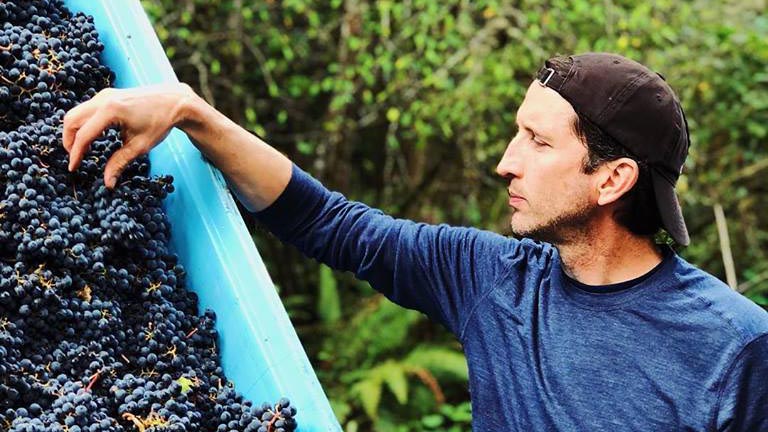Father of two teenage sons, 20-year Bainbridge resident, and founder of Eleven Winery, Matt Albee shares his insight into the community he loves and his concern over the lack of affordable housing—as both business owner and engaged citizen.
“As it turned out, I couldn’t make a living at bicycle racing,” said Matt Albee, owner of Eleven Winery and elite cyclist, sitting on the patio of his tasting room in an industrial building off Day Road. It was a Friday afternoon, and guests were savoring not only wine but the sweet and slow transition from weekday to weekend.
Two plus decades ago, his plans dashed, Matt had an epiphany: he would make wine instead.
“It was a combination of all the things that I love,” he quickly realized when he began working in a small winery in the Bay Area, where he lived at the time. “Art and science and gatherings of friends and family and food.” Matt has a degree in physics, and he is fascinated by the subtle art of vinification. But it is the value placed on gathering that perhaps says the most about what Matt wants for Bainbridge. He wants to see the island as a gathering place and home to people of all ages and of all socioeconomic, racial, and ethnic backgrounds—a vision undermined by the lack of affordable housing.
With one son a BHS graduate and the other entering 10th grade, Matt is alarmed by the drop in school enrollment and the difficulty he has heard Superintendent Peter Bang-Knudsen describe in hiring teachers and staff due to the island’s high-priced housing. Our schools have historically attracted young families to the island, he points out. Drops in enrollment and educational offerings and housing inaccessible to all but the wealthiest threaten to reverse that trend.
With the loss of socioeconomic diversity comes a loss of other kinds of diversity, for as Matt notes, economic status is inextricably linked to the impacts of racial discrimination over generations.
 “There is so much evidence that there is strength in diversity and justice in diversity and resilience in diversity. As things change, as the environment changes, and the climate changes, resilience is critical—diversity of ideas and opinions is going to be critical to finding our way through the changes that are coming our way. And we’re at risk of losing that.”
“There is so much evidence that there is strength in diversity and justice in diversity and resilience in diversity. As things change, as the environment changes, and the climate changes, resilience is critical—diversity of ideas and opinions is going to be critical to finding our way through the changes that are coming our way. And we’re at risk of losing that.”
“I built this business myself and for a long time it was just me muddling my way through. When you start adding people with other perspectives, things start getting a lot better, solutions start being developed that I would not have come up with on my own, and progress gets made more quickly.”
The culture of the tasting room attracts a younger and more local employee demographic, which is great for a business that caters to tourists. Staff often share their intimate knowledge of the island to help guests plan their visits. “We’ve been fortunate in that during the pandemic a lot of young people came home to roost. We’ve got one employee who was awarded a Fulbright … We have another employee who put off going to medical school.” Typically, employees don’t leave for other jobs, but rather to pursue other life plans—that scholarship and medical degree, for example. And the winery pays well to hold on to them as long as it can. Moreover, with business growing 20% a year, Matt has been able to offer opportunities for professional growth, as well as benefits.
Though Eleven Winery has not experienced the impact of housing on its hiring and retention during the pandemic, hiring has previously been and is becoming more challenging again, and he is concerned for his fellow businesses that have struggled to find workers. And he anticipates trouble of his own. “A lot of these people who we have on staff now and were home to roost are going to leave. We’re going to have to replace them, and we’re going to be in the same situation as every other business on Bainbridge, competing in the same talent pool.”
Matt joined the Bainbridge Island Chamber of Commerce board ten years ago to represent the seven wineries on the island. As the longest serving member, he stepped up to chair last year. Like Matt’s, most of these wineries began in people’s homes, and they have since evolved into a significant business force on the island and a major draw for tourists. These scrappy beginnings align with the industry profile in Washington, where small wineries abound (80% of the wineries produce less than 1,000 cases a year) and many do not own the land to grow their grapes
The Pacific Northwest is home to Matt who spent his childhood on Whidbey Island and his wife who hails from Victoria. “We couldn’t afford a doghouse in the Bay Area let alone a place we could have a winery,” but they could just afford a fixer-upper on Bainbridge, making a move north practical from the perspective of economics, if not winemaking. The island back then felt new—city hall had just been built, the Pavilion was still fresh. But after 20 years on Bainbridge (18 since he and his wife crushed their first grapes), the issue of affordable housing feels old. Unlike wine and wisdom, it doesn’t do well with age. Matt, like so many in the business community, is eager for change once and for all, eager to be part of a gathering of stakeholders charged with developing a renewed and vigorous response to the need for housing across the income spectrum.
